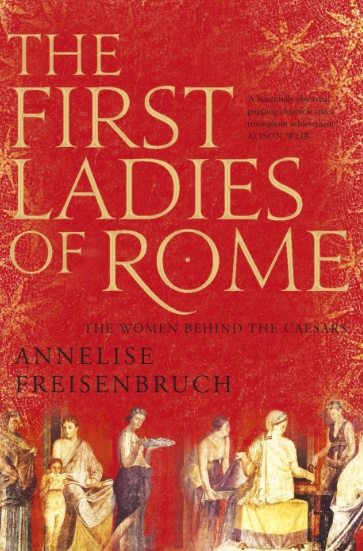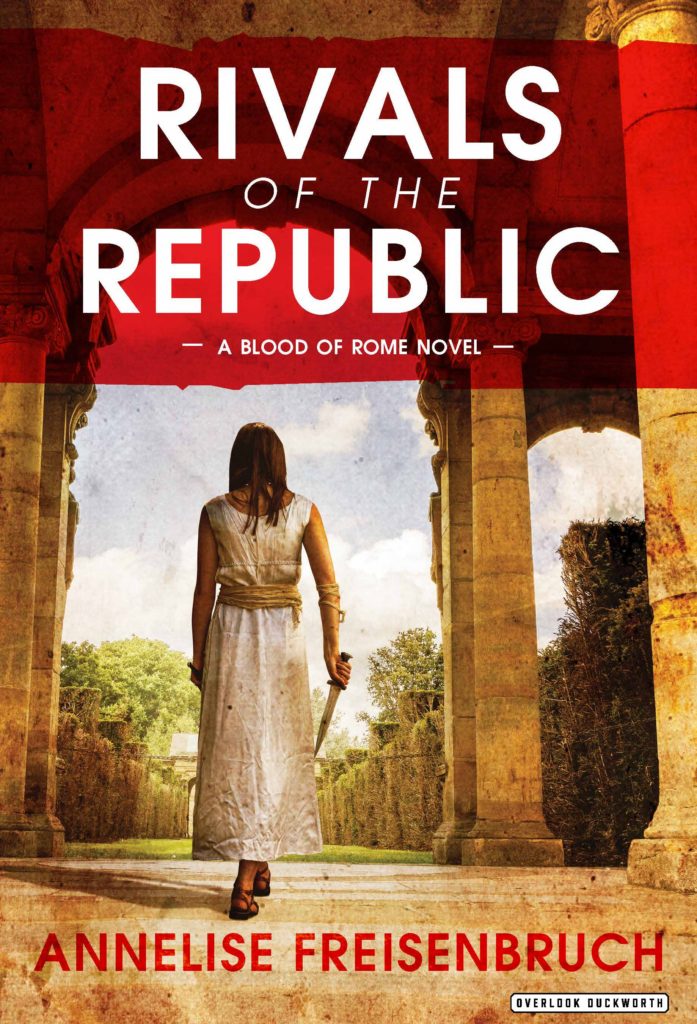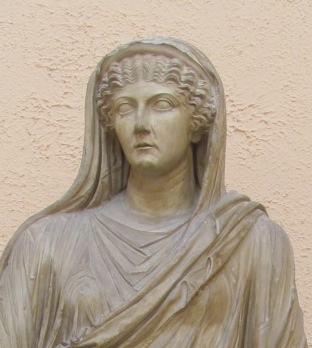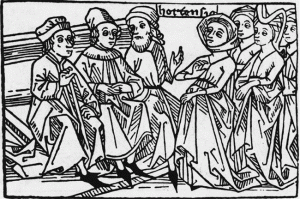 Today I’m delighted to welcome to my blog somebody whose writing I deeply admire. I bought ‘The First Ladies of Rome’, which explored the hidden history of women in Ancient Rome, as soon as I saw it in 2010. The author and today’s honoured guest, Annelise Freisenbruch, was born in Bermuda and studied Classics at Newnham College, Cambridge, receiving her PhD in 2004. She currently lives in Dorset and is Head of Classics at Port Regis School. In 2010, her first book ‘The First Ladies of Rome’ (‘Caesars’ Wives’ in the US) was published to critical acclaim. Her first novel ‘Rivals of the Republic’ – the opening instalment of The Blood of Rome series – has just come out in the US and will appear in the UK on 20 Octoober.
Today I’m delighted to welcome to my blog somebody whose writing I deeply admire. I bought ‘The First Ladies of Rome’, which explored the hidden history of women in Ancient Rome, as soon as I saw it in 2010. The author and today’s honoured guest, Annelise Freisenbruch, was born in Bermuda and studied Classics at Newnham College, Cambridge, receiving her PhD in 2004. She currently lives in Dorset and is Head of Classics at Port Regis School. In 2010, her first book ‘The First Ladies of Rome’ (‘Caesars’ Wives’ in the US) was published to critical acclaim. Her first novel ‘Rivals of the Republic’ – the opening instalment of The Blood of Rome series – has just come out in the US and will appear in the UK on 20 Octoober.
Salve Annelise!
Rivals of the Republic is described as a crime adventure set in the world of the late Roman Republic. It centres on the real-life character of Hortensia, a young woman who has inherited the gifts of her orator father Hortensius, Rome’s flamboyant ‘king of the law court’. Now, what attracted you to the story of Hortensia?
I first came across her name when I was researching the education of Roman women for my first (non-fiction) book, The First Ladies of Rome. We only really know two things about her as a historical figure. One, that she was the daughter of Hortensius Hortalus – Rome’s greatest orator and courtroom rival of Cicero – and two, that she once delivered a much-praised address in the middle of the Roman forum that contradicted traditional Roman thinking that women couldn’t – and shouldn’t – make public speeches (a sentiment, I might add, that still seems to linger in many quarters today).
 I hadn’t given much thought to writing a historical novel up to this point. But I couldn’t get Hortensia out of my head. Her famous speech was delivered during a very tense period in the late Roman Republic, just after the assassination of Julius Caesar. Hortensia was arguing passionately against a proposal that women like her should be taxed for pay for the wars of men. I started to think, where did it all begin for her? – was this the only speech she ever made? What if I create a fictional narrative for her, going back many years before, in which she tries to follow in the footsteps of her father, taking on cases, pursuing them to the law court if necessary, using her wits and intelligence to seek out injustice and corruption? By now I had a clear image of the character in my mind, and I just had to give her a voice.
I hadn’t given much thought to writing a historical novel up to this point. But I couldn’t get Hortensia out of my head. Her famous speech was delivered during a very tense period in the late Roman Republic, just after the assassination of Julius Caesar. Hortensia was arguing passionately against a proposal that women like her should be taxed for pay for the wars of men. I started to think, where did it all begin for her? – was this the only speech she ever made? What if I create a fictional narrative for her, going back many years before, in which she tries to follow in the footsteps of her father, taking on cases, pursuing them to the law court if necessary, using her wits and intelligence to seek out injustice and corruption? By now I had a clear image of the character in my mind, and I just had to give her a voice.
We read a lot about the public and private spheres; our perception is that men occupied the public, military and political, i.e. ostensibly held the power, whereas (respectable) women were confined to the private, i.e. the home, children and domestic management, and lived under the tutelage of father, husband or brother. How true was this and did it change over Rome’s 1229 year long history?
Broadly speaking, this is a pretty accurate characterisation of the roles assigned to men and women in ancient Rome, no matter which point on the timeline you’re talking about. Rome was a man’s world, no two ways about it, and women were expected to stay out of the limelight, confining themselves, as you say, to the domestic sphere.
But we can finesse the picture a little. A very small number of women from the elite political class began to receive public honours and accolades during the Republican period (509BC-27BC) and during the age of emperors (27BC-AD 476) as my first book explores, we see empresses like Livia, Agrippina, Julia Domna and Galla Placidia making the kind of incursions into the public sphere that would have been unthinkable before – becoming highly visible figures in the public pageantry of their sons and husband’s reigns and, according to some sources, exercising extraordinary influence over them.
Even so, we must be careful before we start indulging in fantasies about these women being the real power behind the throne. For a woman to stray too far out of the domestic and into the public sphere – in other words to act too much the man – was a very dangerous game in the Roman world. This, in fact, is part of what makes Hortensia’s story so intriguing. Although her speech was much praised by male Roman writers, it’s made clear the excellence of her oratory is a tribute to the fact that she’s inherited the gift from her father. When my Hortensia ventures into the male-dominated world of the Roman law court and at the same time begins investigating a series of murders that appear to lead to a conspiracy at the heart of Roman politics, her reputation as well as her life is at stake – she is going somewhere women are not supposed to go.
What are the chief obstacles and pleasures of researching and writing women in Republican Rome, a period which ran from 509-27 BC?
Sometimes, I look wistfully at the kind of sources historians from later eras have and think, what wouldn’t I give for a diary or a letter written by a Roman woman in her own hand. The biggest obstacle in researching Roman women is the simple fact that virtually no writing by a woman from the period survives. Even Hortensia’s speech only survives second-hand. Did she write it all herself? Is it a verbatim account of what she said? We just don’t know. We are always limited to seeing Roman women through the eyes of others, usually men who never met them and who are often writing about them decades or even centuries after their deaths.
Conversely, that means that the fragments and clues we DO have are all the more precious and fascinating. There are wonderful, surprising examples of evidence for Roman women’s lives that were certainly helpful to me in writing Rivals of the Republic. To give just one example, I did some research into real-life Roman court cases involving women and came across a divorce case from 100 BC where a man tried – and failed – to keep his wife’s dowry on the grounds that she had been unfaithful during their marriage. I used that case as the inspiration for the trial scene in which Hortensia makes her court room debut.
But for me the greatest joy of writing historical fiction as opposed to non-fiction has been the freedom it’s given me, not just to make good use of the evidence for women’s lives that we do have, but to fill in the gaps around it and paint a full colour portrait of a flesh and blood woman and the world she inhabited. Hortensia feels very real to me now, and I’m hoping that people will love her as much as I do.
Thank you so much, Annelise. (I certainly enjoyed my advance copy of Rivals of the Republic and will be posting a review.)
Connect with Annelise:
Twitter: @afreisenbruch
Website: www.annelisefreisenbruch.co.uk
Rivals of the Republic (hardback) is available now on Amazon.com and for pre-order on Amazon UK.
So what’s Rivals of the Republic about?
 The body of a Vestal Virgin is dragged out of the River Tiber. A senator bleeds to death in his bath. Rome has just survived a period of bloody civil war, and while politics seem steady on the surface, discontent is rising as new alliances—and enemies—are formed.
The body of a Vestal Virgin is dragged out of the River Tiber. A senator bleeds to death in his bath. Rome has just survived a period of bloody civil war, and while politics seem steady on the surface, discontent is rising as new alliances—and enemies—are formed.
As the authorities turn a blind eye, Hortensia, daughter of the capital’s most celebrated orator, feels compelled to investigate a trail of murders that lead to the dark heart of Rome. Flying in the face of her husband’s and father’s attempts to protect her, rebelling against the constraints imposed upon her sex, she is drawn ever deeper into the corrupt underworld that lurks in the shadows cast by the city’s all-powerful elite.
As Hortensia races to uncover and obstruct a plot to overthrow the Roman Republic, only one man can save Hortensia from becoming the next victim of a conspiracy to destroy the Republic: Lucrio, the damaged ex-gladiator to whom she already owes her life. But will the secrets of his own tragic past threaten to subsume them both…
UPDATE: Read Annelise’s article “7 surprising facts about Roman women” at BBC History Extra.
Alison Morton is the author of Roma Nova thrillers, INCEPTIO, PERFIDITAS, SUCCESSIO and AURELIA. The fifth in the series, INSURRECTIO, was published in April 2016.
Find out more about Roma Nova, its origins, stories and heroines…















Great post!
Favourite Roman Woman: Caecilia Metella (daughter of Balearicus), who persuaded the Senate to fund a temple to Juno Sospita based on a dream she had in 90 BCE (only dream – of either a woman or a man – to be sanctioned by the Senate in the Republican period).
The second daughter, mother of Publius Clodius and the infamous Clodia?
It is generally assumed so – although neither source (Julius Obsequens or Cicero) explicitly connects her with them…
Favorite Roman woman: Julia Domna, empress and wife of Septimius Severus, was renowned for her political influence and learning. She was the daughter of a high priest of Emesa in Syria, now Homs. Her portraits are easily recognizable in coins of the empire, including a stunning gold aureus, ca. 193-196 CE, that you can see at https://www.cngcoins.com/Coin.aspx?CoinID=318534.
She was as strong woman of power indeed. Great suggestion!